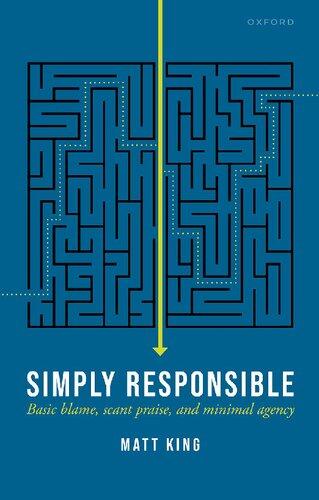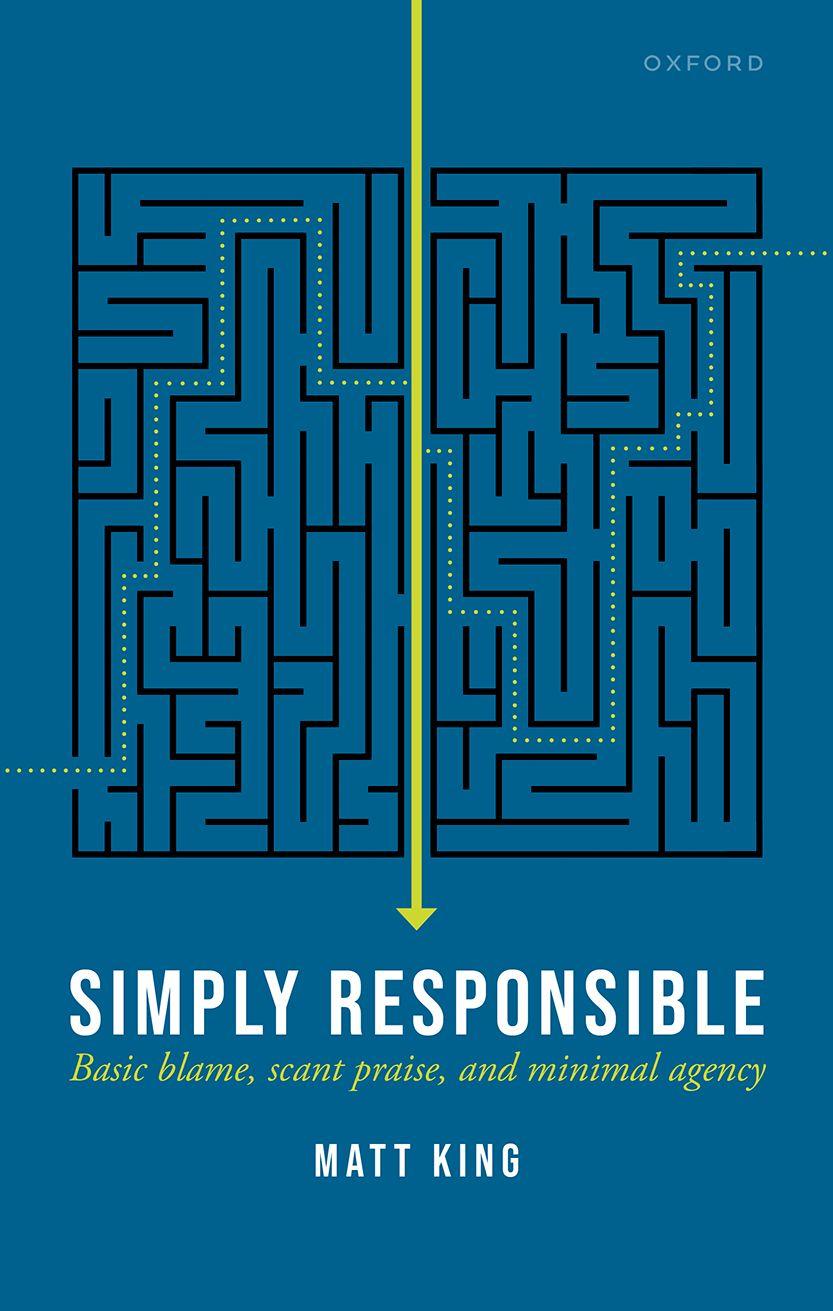Visit to download the full and correct content document: https://ebookmass.com/product/simply-responsible-basic-blame-scant-praise-and-min imal-agency-matt-king/
More products digital (pdf, epub, mobi) instant download maybe you interests ...
King of the World Matt Waters
https://ebookmass.com/product/king-of-the-world-matt-waters/
Universal Basic Income: What Everyone Needs to Know® Matt Zwolinski
https://ebookmass.com/product/universal-basic-income-whateveryone-needs-to-know-matt-zwolinski/
King of the World: The Life of Cyrus the Great Matt
Waters
https://ebookmass.com/product/king-of-the-world-the-life-ofcyrus-the-great-matt-waters/
Simply Lies David Baldacci
https://ebookmass.com/product/simply-lies-david-baldacci-2/
Simply Lies David Baldacci
https://ebookmass.com/product/simply-lies-david-baldacci/
Simply Lies 1st Edition David Baldacci
https://ebookmass.com/product/simply-lies-1st-edition-davidbaldacci/
His Good Girl: An age gap, praise, billionaire dark romance (Praise Them Book 1) Eve Newton
https://ebookmass.com/product/his-good-girl-an-age-gap-praisebillionaire-dark-romance-praise-them-book-1-eve-newton/
Blame It on the Mistletoe Beth Garrod
https://ebookmass.com/product/blame-it-on-the-mistletoe-bethgarrod-3/
War Crimes: Causes, Excuses, And Blame Matthew Talbert
https://ebookmass.com/product/war-crimes-causes-excuses-andblame-matthew-talbert/
SimplyResponsible SimplyResponsible MATTKING GreatClarendonStreet,Oxford,OX26DP, UnitedKingdom
OxfordUniversityPressisadepartmentoftheUniversityofOxford. ItfurtherstheUniversity’sobjectiveofexcellenceinresearch,scholarship, andeducationbypublishingworldwide.Oxfordisaregisteredtrademarkof OxfordUniversityPressintheUKandincertainothercountries
©MattKing2023
Themoralrightsoftheauthorhavebeenasserted Allrightsreserved.Nopartofthispublicationmaybereproduced,storedin aretrievalsystem,ortransmitted,inanyformorbyanymeans,withoutthe priorpermissioninwritingofOxfordUniversityPress,orasexpresslypermitted bylaw,bylicenceorundertermsagreedwiththeappropriatereprographics rightsorganization.Enquiriesconcerningreproductionoutsidethescopeofthe aboveshouldbesenttotheRightsDepartment,OxfordUniversityPress,atthe addressabove
Youmustnotcirculatethisworkinanyotherform andyoumustimposethissameconditiononanyacquirer
PublishedintheUnitedStatesofAmericabyOxfordUniversityPress 198MadisonAvenue,NewYork,NY10016,UnitedStatesofAmerica
BritishLibraryCataloguinginPublicationData Dataavailable
LibraryofCongressControlNumber:2022950586
ISBN978–0–19–288359–9
DOI:10.1093/oso/9780192883599.001.0001
Printedandboundby CPIGroup(UK)Ltd,Croydon,CR04YY
LinkstothirdpartywebsitesareprovidedbyOxfordingoodfaithand forinformationonly.Oxforddisclaimsanyresponsibilityforthematerials containedinanythirdpartywebsitereferencedinthiswork.
Preface I’mthesortofreaderwholikesagoodprefacetoanacademicbook.I’ m mostlyintriguedbytheautobiographicalhistorybehindtheworkor behind-the-scenesdetailsregardinghowittookshape.Ialsoconfessto havingscannedquiteafewtoseeifmynamewasmentioned.Thatsaid, ifprefacesaren’tforyou,Iwon’ttakeoffenseifyouskipthispart.I’llstart withsomebackgroundonhowIcametowritethisbook,andthenI’ll thanksomefolks.(Inthelistsbelow,Igoalphabetically,tohelpothers findtheirnames.)
Themainideaofthisbook firsttookshapewaybackingraduateschool. Likemanywhothinkandwriteaboutresponsibility,Iwasimmediately animatedreadingPeterStrawson’ s “FreedomandResentment.” Ihad startedoutasapoliticalphilosopher,thinkinglargelyaboutissuesof politicallegitimacy.ButIsoonfoundmyselfthinkingaboutourordinary practicesofholdingeachotherresponsible,especiallyStrawson’smethodologyoflookingtowhenitwouldbeinappropriatetoholdothersresponsibleasameanstouncoveringtheconditionsonbeingresponsible. Icouldn’thelpnoticingthatourordinarypracticesextendwellbeyond moralcasesexhibitinggoodandillwilltowardothers,andIwasstruckby themanyparallelsIsawacrossdomains.Icametobelievethatnon-moral casesofresponsibilitywereas theoretically significantasthemoralones. ThisledmetowardaprojectmuchinStrawson’sspirit,Isuppose,butwith averydifferentstructureintheend.Adissertationfollowed,defendinga compatibilistaccountofresponsibility,usingmanyofthosesameobservationsofsymmetry.But,aswithmanydissertations,thediscussionwasabit programmatic,anditcertainlywasabittoofullofitself.
Insubsequentyears,Iwasfortunatetosuccessfullypublishworkona numberoftopicsregardingresponsibility.However,thebroaderproject Ihadbeguninthedissertationdidn’treally figuredirectlyintoanyofit. Itwasstillthereinmythinking,ofcourse,itwasjustoperatinginthe backgroundinwaysthatdidn’taffectthosearguments(Ihope).So,
Ihavebeenthinkingaboutresponsibilityforalmosttwentyyears,andit hastakenthatlongformetodevelopthatbasicviewintosomething presentable.Ifyouareoneofthesixpeoplewhoreadmydissertation, you ’llnodoubtrecognizemanyfamiliarideasandthemes.ButIhope youwillalsoappreciatethewaysinwhichtheideasaremorerefinedand thetheorymoremature.Fortherestofyou,you’llbenoworseofffor havingmissedmyearlieroffering,thoughsomeofyoumaywishIhad takenevenlonger.
Therearemanypeopletothank.I’llbeginbythankingtwograduate schoolofficemates,JoshKassnerandBénédicteVeillet,whoweresubjectedtomyveryearlythoughtsonthesignificanceofnon-moralcases. Sincethen,Bénédictehasbeenfurthersubjectedtomydeveloping thoughtsonthesematters,andI’mgratefulforhermanyinsightsand friendshipovertheyears.SpecialthanksaswelltoPeterCarruthers, whoseguidanceingraduateschool andbeyond hasbeeninvaluable. Inparticular,he’sbeenveryinfluentialinhowIthinkaboutminds. Around2007,IsomehowconvincedManuelVargasintoservingasthe externalmemberonmydissertationcommittee,despitehavingnever reallymethimbefore.Withhispatienceandfriendlycriticisms,froma three-daymarathontogoovertheentiredissertation(overthephone, andalandline,noless)tomanysubsequentexchangesovertheyears,he hasbeenamostgenerousmentor.A final “oldschool” thanksgoesto MarkSchroeder,whosupervisedmydissertation.Muchofmycurrent thinkingonresponsibilityhasbeenshapedbyboththespacehegaveme todevelopmyownideasandhisuncannyabilitytounderstandthevirtues ofthoseideasbetterthanIdid.Throughoutmycareer,I’veoftenturnedto Markforadvice,andhehasrarelysteeredmewrong.I’mparticularly pleasedthathehas finallyturnedsomeofhisownattentiontoward thinkingaboutresponsibility,sonowhecanlearnfrommeforachange.
Overtheyears,severalseniorphilosophershavetakenthetimeto engagewithmeandmywork.Whethertheyknewitornot,their attentionorkindwordsoftencameattheprecisemomentwhen Ineededitmost.MythankstoSarahBuss,JohnMartinFischer, PamelaHieronymi,MichaelMcKenna,HerbertMorris,GeorgeSher, SeanaShiffrin,DavidShoemaker,AngelaSmith,HollySmith,Markvan Roojen,GaryWatson,andGideonYaffe.
Asforthebookyounowholdinyourhands(oronyourscreens),it benefitedfromthecontributionsofmanyindividuals.Severalpeople readandcommentedonfulldraftsofthemanuscript:JohnMartin Fischer,JoshMay,MarkSchroeder,andDavidShoemaker.Eachunquestionablyimprovedthe finalproduct.Iinvitethemtoreadthebookagain carefullytoseethefruitsoftheirlabors.
I’dliketothankthe “Simpletons” ReadingGroup:EricBrown,Daniel Miller,andNickSars.WehungoutonZoominthreeseparate sessionstodiscusstheentiremanuscriptduringsummer2021,when Ihadthebasicideas(mostly)workedoutbutmanyofthedetailsunderdeveloped.(NickSarsdeservesanadditionalshoutoutforgivingme pagesoffurthercommentsaftereachsession.)Theirsharpcriticisms andconstructivesuggestionsareevidentinallchapters,evenifsomeof thedetailsremainunder-developed.Theyare,however,onlynow findingoutwhatInamedourlittlegroup(owingtothebook’stitle,notour collectiveintellect!).
ThebulkofthewritingwascompletedwhileIwasonsabbaticalfrom UAB.MythankstotheProvost’sOffice,Dean’sOffice,andmychair, DavidChan,forgrantingmetheyearofffromregulardutiestocomplete themanuscript.
Duringthatsametime,IwasfortunatetoholdaMurphyFellowshipat thewonderfulMurphyInstituteatTulane.MythankstoStevenSheffrin andDavidShoemaker,whowereatthetimeExecutiveDirectorofthe InstituteandDirectoroftheCenterforEthicsandPublicAffairs, respectively,fortheopportunitytoworkandlearnwithsomanygreat colleagues.TheconstraintsoftheCOVID-19pandemicforcedmeto makethemostofthefellowshipremotely,soaddedthankstothe Instituteandallinvolvedforprovidingsuchanexcellentandaccommodatingenvironmentinwhichtowork.Aspartofmyyear “at” Tulane, Iwasabletopresentasnapshotofthebook’sprojectearlyinitsdevelopment.Mythankstoallwhoattendedandaskedgreatquestions:Nathan Biebel,BruceBower,EricBrown, AlisonDenham,RobertHartman, CynthiaMa,DavidO’Brien,AbelardPodgorski,JonathanRiley,NickSars, DavidShoemaker,ChadVanSchoelandt,GeoffWeiss.Abelard PodgorskiandRobertHartmanwarrantspecialthanks asmyfellow MurphyFellowstheywerearegularsourceofsupportandinsightasIwrote.
Inthelaterstagesofwriting,Iwasluckytopresentmaterialfromthe latterhalfofthebook mainlysomeideasaboutblame toseveral audiences.I’dliketothankalltheparticipantsfortheirpenetrating andhelpfulquestions:PeterCarruthers,ShenPan,PaoloSantorio,and AllenStairs(UniversityofMarylandWork-in-ProgressSeries);Abdul Ansari,SarahBuss,JasonByas,MicaRapstine,PeterRailton,Joseph Shin,ChandraSripada,andLianghua(Glenn)Zhou(Universityof Michigan’sEthicsDiscussionGroup);TrevorAdams,AaronBronfman, BjornFlanagan,GuillermoGonzalez,JanelleGormley,JasonLemmon, JenniferMcKitrick,AdamThomson,andMarkvanRoojen(Universityof Nebraska-LincolnSeminar);DavidBrink,RosalindChaplin,Kathleen Connelly,YingLiu,DanaNelkin,SamRidge,ManuelVargas,and ShawnTinghaoWang(UniversityofCalifornia-SanDiegoAgencyand ResponsibilityGroup).Ihadafantastictimewitheachgroup,and,while Itriedtotakeaccuratenotesofwhowasthere,mysincereapologiesto anyoneImayhavemissed.
AdditionalthankstoPeterMomtchiloffatOUPandtwoanonymous reviewersfortheirhelpfulguidanceonthemanuscriptandforconsideringtheprojectonitsownterms.ThanksaswelltotheentireOUP productionteamfortheexcellentworkbridgingthegapbetweenmy files andanactualbook.
Thecommunityofphilosophersworkingonactionandresponsibility hasbeenthemostwelcoming,generous,and,dareIsay,fungroupI’ ve met.I’mgratefultoyouallformakingthatcommunitysospecial.Given myfallibility,I’msureI’mforgottentothanksomeone,forwhichI’ m sorry.I’msomewhatconsoled,however,bythefactthat,sincewe’rethe kindestandcoolestphilosophersaround,noonewillholditagainstme.
My final,anddeepest,gratitudegoestomyspouse,Jennifer.Atthis stage,itissimplyimpossibletodisentangleallthevariousthreadsof support,insight,andpartnershipthatshehasprovidedovertheyears. Shedeservesspecialrecognitionforhavingtolistentomoreofmyideas onresponsibilitythananybody,andshehasdonesowithvirtuous goodhumor,wisdom,andclarityofthought.Simplyput:thankyou foreverything.
Introduction AGeneralTheoryofResponsibility Thisbookisaboutresponsibility.
Moralresponsibilityisseriousbusiness.Holdingothersresponsible fortheiractionsiscentraltoourordinarypractices.Weblame,wepraise, wedecry,weapplaud,wepunish,wepinstars.Whensomeonewrongs us,orshowsusgreatkindness,werespondwithourangerorgratitude accordingly,blamingorpraisingthemfortheirdeeds.
However,ourordinarypracticesarenotlimitedtomoralactions.We alsoholdpeopleresponsibleforawiderangeofnon-moralactivities. Wecheerthecatchandwebootheref.Wegiveone-starreviewsandwe commendthechef.
Theradicalproposalforthisbookisthattheblameworthyartistis responsiblein justthesameway thattheblameworthythiefis.Wecanbe responsibleforallkindsofdifferentactivities,fromlip-synchingtolong division,frommurderstomeringues.Buttherelationinvolved,whatI’ll callthe basicresponsibilityrelation,isthesameineverycase.Weare responsibleforthethingswedo first,thenblameworthyorpraiseworthy forhavingdonetheminlightofwhetherthey’regoodorbad,according toavarietyofstandards.
Whyisthisaradicalproposal?Firstly,becausesomuchofthe contemporaryliteratureonmoralresponsibilityhasmoralizeditsnature. Accordingtothevastmajorityofaccounts,moralresponsibilityiseither aspecialspeciesofresponsibilityorelsedependsonmoralizedcapacities. Incontrast,Ithinkthatwegetamorecompleteandunifyingpictureof responsibleagencyfromamoregeneraltheoryofresponsibility.
Secondly,theproposalisradicalduetoitsdrasticsimplicity.Iforego manyofthecomplicationsthatfeatureinotheraccountsofresponsibility,arguingthatwecanmakedowithlessdemandingtheoretical
elements.Theresultingaccountisexceedinglyminimal,andyet, Iremainattractedtoitsnumerousvirtuesandexplanatorystrengths.
AnInitialCaseStudy Someyearsago,IattendedaperformanceofBeethoven’sFifth Symphony,putonbymylocalorchestra.It’safavoriteofmine,anda familiarone(especiallythatopeningphrase),deservedlyrecognizedasa masterpiece.Thatnight,itwassuperblyperformedbytheorchestra.At itsconclusion,therewasastandingovationthatpersistedforsometime. (Therewasalso,ifmemoryserves,agoodbitofwhistling,hooting,anda smidgeofhurrahing.)ItstruckmeatthetimethatIwasdoing(atleast) twoseparatethings.One,Iwasapplaudingtheorchestra,whohadso admirablyexecutedawonderfulpieceofmusic.Two,Iwasstandingin admirationofthepieceofmusicitself,directingacclaimatBeethoven, thecomposer.
Thisseemstometomakeperfectsense.Thecompositionisamazing initsownright,¹andwouldremainso,evenifaparticularperformance missedthemark.Buttheorchestra’sperformanceisseparablefromthe compositionintheotherdirectionaswell.Thesymphonyisinertuntil broughttolifebytheperformance,and,asaficionadoswilltellyou,there ismuchroomforinterpretationinanorchestralscore.Thattheperformancewassolovelywasacredittotheorchestraanditsmembers,quite apartfromBeethoven’scontribution.
Atthisstage,Iwanttomakebuttwobriefpointsaboutthis,dareIsay, ordinaryexample.First,therearemanydifferentsortsof things forwhich wecanbecelebrated.Composingagreatcaprice,forinstance,isonesort ofthing.Performingthatcapriceisanother.Ifonethinksaboutit,there isn’tawholelotthatcompositionhasincommonwithperformance, and,ofcourse,onecanbeagreatperformerwithoutbeingagreat composer(andviceversa).
¹Selectinganyworkonwhichtobasethislittlebitofcommentaryisabitrisky,sincea readermaynotsharemyestimationofthework.Butmyobservationsshouldgeneralizetoany pieceofmusiconeprefersinstead.
Butourpraiseisnotlimitedtogreatworksofart.Wearecelebrated forourcontributionsatwork,thecakewebake,andtheshotswemake. Thereisagreatdiversitytoandbroadrangeofthingsforwhichweare praised.
Theseobservationsextendtothenegativesideofthingsaswell.We arecriticizedforourcooking,ourtripplanning,andourmismanagementofmoneyortime.Thereisnolessdiversityhere.
ThesecondpointIwanttomakeisthatthereisalsoawideanddiverse rangeof ways inwhichwecelebrateothers.Weapplaud(butalsohoot andholler),wefête,wewritemovingtributes,wesmile,wecheer,we standinawe,andwehandouttrophies.Again,thereisn’tmuchthat cheeringhasincommonwithhandingoverabronzestatuette.Yet,both arewaysbywhichwegivepraise.
Similarclaimsapply,again,tothenegativesideofthings.Weboo,we givenegativereviews,wejeerandcalloutothers,wemarkdown,wefeel ourirerise,andweimposepenalties.Again,thereisextraordinary diversity,andyetallarewaysofdisparagingothers.
Imaketheseobservationsattheoutsettoindicatethesetofphenomena withwhichI’minterested.Weblameandpraiseeachotherthroughouta remarkablerangeofhumanendeavors anincrediblydiversesetofactivitiestakingplacewithinastaggeringarrayofdomains.Acrossacademic, artistic,andathleticdomains(justtostickwith “A”),wecommendand condemn,acclaimandaccuse,givepropsandthrowshade.
Itstrikesmethatweclearlyholdeachotherresponsibleforwhatwedo inalltheseareas.Mystartingpoint,then,isthewholerangeofhuman activity(thoughIwilloftenprivilegeartisticandathleticcases,tokeep thediscussionfocused).Importantly,aguidingideaofthisbookis thattheentiresetofhumanactivity,whilebroadanddiffuse,isnonethelessfundamentally unified.Thereisnospecialmoralrealmofenterprise;rather,wedothingsintheworldthatcanbeassessedinavarietyof ways.Wearenotmorallyresponsibleforsomethingswedo.Weare simplyresponsibleforthem,andsomeofthemturnouttobemorally evaluable.²
²Arguably,virtuallyallweareresponsibleforisatleast open tomoralassessment.Onevirtue oftheaccountisthatitcandeliverthisresultstraightforwardlyandsimply.
What’sinaName? Philosophicalworkonmoralresponsibilityhasexplodedinthelast twenty-fiveyearsorso.Inthattime,numerousfamiliesoftheories,styles ofapproaches,andanincreasingdiversityofdistinctionshaveproliferated.Ithasbecomecommonplacetosituateone’sownaccountwithina panoplyoftrademarkedcampsorpickone’steaminaseriesofdebated distinctions.³WhileIwill,ofcourse,placemyviewincontemporary context,I’mdrivenmorebyadistinctivemethodologyandthetheoreticalvirtuesofgeneralityandsimplicitythanbythesignpostsandguardrailsplacedbyextantdiscussions.Thecentralconceitofthebookisthat ourbesttheoryofresponsibilityshouldbedevelopedoutofafullerrange ofcasesacrossabroadersetofdomains.⁴ Idon’tpretendtotheorizeina vacuum,butIdoexplicitlyseekagreaterlevelofgeneralitythanmost mainstreamwork.⁵
³Apartialsetincludes:attributabilityvs.answerabilityvs.accountability;voluntarismvs. non-voluntarism;real-selfvs.control-basedaccounts.
⁴ Russell2008startsfromasimilarpremise,parallelismbetweenartandmorality,butthe focusisonfreewillanditscompatibilitywithdeterminism,andthechiefexplorationisthrough concernsregardingtheproblemofluck.Wethusdevelopthestartingpointindifferent directionswithdifferentdetails.Haji1998alsodiscussesblameworthinessacrossnormative domains,butleavestheconceptunanalyzed,anddoesn’tdetailasupportingaccountof responsibilitytocoveralltheinstances.Otherprojectsthatlookatthebroadsetofagential activities,butwithoutafocusonresponsibility,includeBradford2015andShepherd2021.
⁵ Admittedly,thisisshifting.Someveryrecentworkhasstartedtolookatsimilaritiesacross domains.Seee.g.Brink2021(onlegalandmoral);Matheson&Milam2022(onnon-moral blame);Nelkin2020(onmoral,aesthetic,andepistemicresponsibility);Shoemaker2022(on athleticanger).Still,myapproachhereisdistinctiveinjusthowgeneralitaimstobe(and,of course,inthedetailsoftheaccount).ThemostsimilarapproachmightbeinWolf2015:
Philosophersofactionandofethicstendtothinkthatmoralresponsibilityis a centralifnot the centralfeatureofhumanbeingsthatdistinguishus,atleastina goodway,fromloweranimalsandmachines.Butifmoralresponsibilityisnotapart ofsomelargerormoregeneralfeatureofhumanagency,itwillbeirrelevanttoour capacityforhumororcreativityortooursusceptibilitytonatureortobeauty.Itwill beirrelevanttomuchofwhatmakesusalternativelylovableorobnoxioustoeach other.Thissuggeststhateithermoralresponsibilityhasmorelimitedsignificance thanthesephilosophersthink,or asIwouldprefer thatthemostimportantand deepkindofresponsibilitythatdistinguishesusashumanisnotlimitedtothe moral.(141)
Aswe’llsee,thereareimportantpointsofdivergencebetweenthispictureandtheoneI’ll defendinthisbook,butthebasicsentiment thatthemostimportantanddeepkindof responsibilityisnotlimitedtothemoral isthesame.
Indeed,despiteallthediversificationintheliterature,thevastmajority oftheoriesaredesignedastheoriesof moral responsibility.⁶ Theyare organizedaroundcasesofmoralsignificanceandmoralevaluation, actionsthatareeithermorallybadorwrong.(Indeed,evenmoral praisehasbeengivenshortshrift.)⁷ Forexample,MichaelMcKenna considersthat “[p]erhapsthereisadistinctnotionofpersonalresponsibility(betweenintimates),orprofessionalresponsibility;anotherthat concernsaestheticcommitments,orathleticcommitments,ormattersof etiquette” (2012:7),beforesettingsuchconsiderationsaside.R.Jay Wallaceadmitsthatwepraiseanartist’ s “strikingandsuccessfulwork ofart” suchthat “ourpraiseandadmirationreflectakindofcreditonits creator” andthatwecan “condemnthepianist’slatestperformance ...in awaythatreflectsdiscreditonthepianist,” butdismissessuchcases because “thiskindofdirectappraisaldoesnotseemespeciallymoralin itsquality” (1994:53–4).Moreoften,atheory’sdefaultconcerniswith themoralcases,andsotheparallelinstancesaren’texplicitlyaddressed.⁸ Thisfocusis,inonesense,perfectlyunderstandable,sincewhat motivatesourconsiderationofquestionsofresponsibilityissooftenits moraldimensions.Itiscasesofwrongdoingandpunishment,ofviciousnessandharm,thatsoanimateourinitialinterest.Itisthusunsurprising thatmanywouldbeginwiththemoral.Nevertheless,neglectingthenonmoralcasesrisksmyopia.Ifwelimitourgazetomorallysignificant actions,itcanappearobviousthatnon-moralcasesaren’trelevantto developingatheoryofmoralresponsibility.Indeed,itiscommonfor theoriststosimplystipulatethattheirtheoreticalfocusisonmoral responsibility.Oneadvantageofsuchamoveisthatitclarifiesone ’ s projectattheoutset.Responsibilityisaparticularlynebulousand shiftytopic.Thewaysinwhichwetalkaboutresponsibilityare “richly
⁶ Whilethisorthodoxyisslowlyshifting,andthoughtherehavecertainlybeenexceptions (e.g.Fischer&Ravizza1998takesthemoralresponsibilityrelationtoapplytonon-moral actionsandoutcomes),itremainstruethatmosttheoriesofresponsibilityaredevelopedin exclusivelymoralterms.Eventhosethatindicatetherelevanceofnon-moralinstancestendto focusexclusivelyonmoralcasesindevelopingtheirviews.
⁷ Shoemaker2015andVargas2013arenotablerecentexceptions.
⁸ Stillothersgiveaccountsofsomethingmuchclosertofreewill,ifunderstoodasthecontrol conditiononresponsibility.SeeMcKenna2012fordiscussion.Primeexampleswouldbe Fischer&Ravizza1998andMele1995.Evenso,theirfocusstilltendstoberestrictedto moralphenomena(explicitlysointhecaseofMele).
ambiguous,”⁹ suggestingsubtlebutpotentiallyimportantdifferences.An attractiveapproachtosuchanebuloustopicistostartwithsome stipulationsinaneffortmakethequestionsmoretractableandnarrow the fieldofinquiry.
Asignificantdrawbackofsuchanapproach,however,isthatstipulationsrestrictthetheoreticalpossibilities.¹⁰ Forinstance,anapproachthat concernsitselfwithblameworthinessalonedeniesitselfpotential resourcesthatmayberevealedbyexaminingpraiseworthiness.¹¹Ifa viewconstrictsitsfocustomoralcasesalone,itexcludesthepossibility thatnon-moralcasesmayshedadditionallightontheconditionson moralresponsibility.Indeed,evenstipulatingthesenseofresponsibility oneisinvestigatingpresumestherearedifferentsortsofresponsibilityto giveanaccountof,andthattheyareindeedseparable.Regardless,while theremaywellbemultiplekindsofresponsibility,Idon’twanttobias thatquestionby fiatincharacterizingtheproject.Amajorobjectivein thediscussiontocomeistoclarifythenotionofresponsibilityunderlyingagentialassessmentacrossevaluativedomains.¹²
Ofcourse,theoristshavediscretionoverthestartingpointsoftheir theoriesorinaddressingthephenomenainwhichthey’reinterested.But theydosoattheirownperil;fortheoriesarenotconstrainedsolelyby whattheysetouttoexplain.Forexample,Iamwritingthisinmyhome inAlabama,whichhascoastlineontheGulfofMexico.Asaresult,we
⁹ Zimmerman1988:1.HeinturncitesBaier1970:103–7;Glover1970:19;andHart1968: 211–12,asmakingsimilarobservations.Nodoubtthisisapervasivefeatureofthebackground ontheorizingabout “responsibility.”
¹
⁰ SeeRosen2015forananalysisofmoralresponsibilitythatbegins,explicitly,withseveral roundsofstipulations.Itisamodelofclarity,anditmakestheresultingdiscussionextremely composedandtractable.Italso,bynecessity,restrictstheoreticaloptions,andinvolvesruling outcertainpossibilities: “Whenyouadmiresomeonefor ...her fineperformanceonthebongos, youdonottherebydeemher morally responsibleinanysense” (68n.7,italicsinoriginal). Idon’twanttostipulativelyforeclosethepossibilitythatexcellentbongo-playingisrelevantto moralresponsibility.
¹¹SeeWallace1994forsuchaview.
¹²Ifithelps,onecanimagineforamomentthatitis1995.AlanisMorissette’ s “JaggedLittle Pill” isdominatingtheairwaves, “Matlock” justbroadcastits finalepisode,andNASA’sGalileo probehasreachedJupiter.Ofmoreimmediatebearing,GaryWatsonhasn’tyetpublished “Two FacesofResponsibility” (thoughitsideasmaycertainlyhavestartedcirculating,Ican’tspeakto that).Consequently,theliteratureisn’tframedbyadivisionbetweenkindsofresponsibility,like attributabilityandaccountability.(Ofcourse,onewillhavetoreturntothepresenttocontinue reading,elsemanyofmyreferenceswillmakenosense.)Ireturntotheideaofpluralismabout responsibilityinChapter5.
oftenpayattentiontohurricaneactivity.ThoughIamunlikelytofacea hurricanedirectlywhereIlive,thesepowerfulstormsyieldindirect effects.Theyposesignificantthreatstonearbyareasandaffectlocal weatherpatterns,includingincreasingtheriskof floodingortornadoes. So,whileIdon’tworryabouthurricanesperse,theyarerelevanttomy concerns.(Indeed,sincemovingherein2014,therehavebeentwo hurricaneremnantsthathavepassedthroughtownastropicaldepressionsaftermakinglandfall,andmanymorehavecomenearby.)
Incontrast,Idon’tworryabouttyphoonsatall.¹³Typhoonsarepacific tropicalstorms(between100and180degreeslongitude).Theyoccur veryfarawayfrommyhomeinAlabama,andtendtomovefromeastto west i.e. further awayfromme.Whilesuchstormsmightproduce incidentaleffectsonmyweatherorwell-being,theseareveryunlikely tobesignificantenoughformetopayattentionto.¹⁴
Fortherecord,typhoonsarelimitedtothenorthernhemisphere. StormsinthesouthernIndianorsouthwesternPacificoceansaresimply calledbythegeneric, “cyclone.” So,ifyouliveinAlabama,youworry abouthurricanes.InJapan,it’styphoons.AndTongansshouldbeonthe lookoutforcyclones.
Ifwewanttogivean account oftropicalcyclones,however,itwon’tdo tolimitourgazetohurricanes.Evenifwebeginwithonlyaninterestin Caribbeanstorms,evenifwegenerateaperfectlyadequateaccount ofCaribbeanstorms,ourexplanationswillplausiblynotbelimitedto Caribbeanphenomena.Giventhesimilaritiesbetweenhurricanes, typhoons,andcyclones,weshouldwanttoexplainthosesimilarities. Thus,anaccountofcyclonesoughttoexplainnotjusthurricanes,but typhoonsaswell.
Thoughfocusedonmeteorologicalphenomena,thereisaninstructive methodologicallessonhere.Theoriesseektounifyarangeofphenomena undergeneralexplanations.Moregeneraltheories,naturally,seekto unifya broader rangeofphenomenaunder more generalexplanations. Myproposalhereistoseekamoregeneralexplanationofbothmoral
¹³Onthesedistinctionsbetweenkindsofstorms,IfollowNationalPublicRadio’sreporting (https://www.npr.org/sections/thetwo- way/2013/11/08/243980516/which-is-it-hurricanetyphoon-or-tropical-cyclone).
¹⁴ Thesufferingtheycausewheretheyarelocatedisanothermatterentirely.
andnon-moralconduct.I’llarguethattheparallelsbetweenmoraland non-moralevaluationrevealanunderlyingcommonality,whatI’llcall the basicresponsibilityrelation.Imaybemistaken,ofcourse.Perhaps moralblameworthinessandpraiseworthinessreallyaredistinctive, andmoralresponsibilityisitsownspecialrelation.¹⁵ Butthereisa differencebetweenobjectingtoageneralaccountanddismissingit. OnecannotdismissplanetarymotionwhilstdefendingGalileoover Newton,insistingthatoneisonlyconcernedwiththemotionoffalling bodies,orignoreMaxwell ’ saccountofelectromagnetismbystipulating aninterestinelectricityalone.Likewise,onecannotdismissmy approachbecauseonethinksthenon-moralcasesareirrelevantto moralresponsibility,for evenif theyare,theyareclearlyrelevanttoa moregeneraltheory.
BeingResponsible Thegoalofthepresentproject,inanycase,istopresentapositive generaltheoryofresponsibility,andIwillthussayrelativelylittleupfront tosharpentheconcept.Nevertheless,therearesomegeneralremarksto helptosetexpectations.Bywayoforientingthediscussion,it’simportanttosignalthatmyprimaryinterestconcernswhatittakestobe responsible,inthesensethatBeethovenisresponsibleforhis5th Symphonyandtheorchestrawasresponsibleforthatperformance.¹⁶ Iconsiderthistobetheprincipalquestionforatheoryofresponsibility, oneexplanatorilypriortoquestionsabouttheappropriatenessofholdingsomeoneresponsible.¹⁷
¹⁵ Obviously,Idon’tdenythattherearesomedifferencesbetweenmoralandnon-moral responsibility.Ionlydenythatmoralresponsibilityisadistinctiverelation.Still,it’splausible thatmoralresponsibilityhasadistinctive significance,apointtowhichIreturnatvariousstages.
¹⁶ Or,alternatively,eachofitsmembersfortheircontribution.Thequestionofcollective responsibilityisinterestinginitsownright,butIwon’tconsiderithere.Forsomerelevant discussion,seeBjörnsson&Hess2017;French1984;Isaacs2011.
¹⁷ Cf.Smith2007: “tosaythatapersonismorallyresponsibleforsomethingistosaythatit canbeattributedtoherinthewaythatisrequiredinorderforittobeabasisformoral appraisal” (467).SeealsoBerofsky1987;Oakley1992;Scanlon1998(allreferencedinSmith 2007:468n.6).
Responsibilityofthissortconcerns(amongotherthings)theproblem offreewill,¹⁸ ourabilitytoexertmeaningfulcontroloverwhatwedo,to authorourownstories,andtobegenuinelyworthyoftheevaluations othersmakeofus.Thesefeatures,however,whileundeniablycrucialto ourmoralpractices,arefarmoregeneralthanthis.Theyspeaktoour naturesasagents,beingswhoactintheworldtocreateart,advance science,achievegreatfeatsofathleticprowess,andyes,domoralevilas wellasgood.
WhileIwillconsultourpracticesofholdingeachotherresponsiblein whatfollows,Itakethosepracticestobeofsecondaryexplanatory importance.Thisisnotbecausetheyarelessimportant.Onthecontrary, they figureintosomeofthemostsignificantwayswerelatetoone another.(Though,crucially,theydonotexhaustthoseways.)Butmy aimisnottojustifyourpractices.Instead,Ienlisttheminserviceof gettingcleareraboutbeingresponsible.¹⁹ Thus,forme,thejustification ofourpractices,andallthecontoursoftheirparticularelements,is importantlyaseparatequestion(orsetofquestions).
Admittedly,evendesignatingthissetofpracticesasthecategoryof “holdingresponsible” isimperfect,given,asitdoes,itsstrongeraffinity forthenegativesideofthings.Itissomewhatodd,forinstance,tosay thatwhenwegiveoutanEmmywearetherebyholdingtheperformer responsibleforherperformance.But,forallthat,Ithinkitclearthatwe takesuchperformerstoberesponsiblefortheirperformances,and,if theywerenot,wewouldhavecleargroundsfordenyingthemtheaward.
¹⁸ Thereisnoconsensusonjustwhat the problemoffreewillis.ButItakeatleastamajor recognizablestrandofthatproblemtoconcernourabilitytobemeaningfullyconnectedtothe thingswedointheworldgiventhewaythattheworldisstructured.
¹⁹ Cf.Shoemaker2015,whichcitesadivisionbetweentheoriesthattakebeingresponsibleto betheprimaryrelation(whathecallstheb-tradition)andthosethattaketheappropriatenessof holdingresponsibletobeprimary(whathecallstheh-tradition)(19–20).SeealsoBrink& Nelkin2013.Inmyview,theheteronomyofourpracticesofholdingothersresponsible,the widevarietyinourappropriateresponses,makestheh-traditionunstable.Themorevariedour responses,thelesslikelywearetoderiveanotionofbeingresponsibleoutofthem,ratherthan many.Theh-tradition,then,ismorelikelytoresultinpluralismaboutresponsibilityasa methodologicalconsequence.Itaketheretobesomesociologicalsupportforthisclaimgiven thatmosth-traditiontheoristsareeitherpluralistsaboutresponsibilityorelseartificiallyrestrict thescopeoftheirviews.Foranuanceddiscussionoftherelativepriorityofthesetwoquestions, bywhichI’vebeeninfluenced,seeMcKenna2012:39–55.
ItisthereforeperhapsmostaccuratetosaythatIbeginwitha distinctionbetweenwhatittakestoberesponsibleandhowweought torespondtotheresponsible.Theseresponses,howwetreattheblameworthyandpraiseworthy,thewaysinwhichwetaketheirresponsibility tobesignificant,canallcountasresponsibility-relatedelementsofour practices.Yet,despitebeingrelatedtoresponsibility,itdoesn’tfollow thatthisdiverseanddisparatesetofpracticesshouldbetheprincipal provinceoftheoriesofresponsibility.Weviewandrelatetoeachotherin variousways.Assubjects-of-a-life,asmoralpatients,asembeddedin relationships(friends;family;teammates),asinhabitingroles(citizen; shopkeeper;artist),assourcesofinterdependence,asmindedcreatures withcomplexattitudesandemotions,etc.Icannothopetoaddress allthesefeaturesthatbearonourinterpersonalinteractions,nordo Ithinktheymustallbecentraltoatheoryofresponsibility,especially ifthattheoryisaimingatasuitablelevelofgenerality.WhatIproposeis startingwithawaythatwerelatetotheworldaroundus,savingthese interpersonaldynamicsforlater-stagetheorizing.
Myframingoftheissuesthen,isessentially metaphysical.Strawson (1962)mayhavebeenrightthatthereismuchaboutrelatingtoother personsthatisinsulatedfrom “panickymetaphysics,” butthereisalso somethingcentrallyrelevanttohowweinteractwiththeworld.Inmy view,whenweareresponsibleforthings,itisourconnectiontothose thingsthatmatters.Andthatrelationisprimarilymetaphysical.²⁰
Onewaytoapproachthisideaclearlyistothinkaboutthenotionsof apologyandforgiveness.Onecouldinsistthatbotharecentralelements ofatheoryofresponsibility.Ithinktheyarebetterconceivedasconstituentsofabroaderdomainregardingthedynamicsofourresponsestothose responsibleforthings,onewhichfaroutstripstheboundariesof,forlack ofabetterterm,theresponsibilitydomain.Assomeinitialevidencefor thispriority,noticethatweremainresponsibleandblameworthyforthe
²⁰ Itakenostand,however,ontheprecisenatureofthemetaphysicsinvolved,whetherthe relationistobeunderstoodas,say,partofthe “furnitureoftheuniverse” orinsomeother respectableway.Theideahereissimplythatresponsibilityisbestunderstoodasrelating personstothingstheycanbeevaluatedforinawaythatisinescapablymetaphysical,incontrast tocertaincontemporaryapproachesthatframequestionsofresponsibilityinnormativeterms (seee.g.Darwall2006;Scanlon2008;Wallace1994).
thingswe’vedoneevenwhenwe’reforgivenforthemanditoftenmakes perfectsensetoapologizeforthingsforwhichwearen’tresponsible (damageproducedbyourchild;aninnocentbutconsequentialmistake). Naturally,ourmoregeneraltheorieswillhavetoaccommodatefactsabout apologyandforgiveness.Butthatistobeexpected.Indeed,totheextent thatnon-moralapologyabounds(aplayermightapologizetoateammate fordroppingapass andbesubsequentlyforgiven),thegeneralframeworkI’mprovidingmayprovefruitfulbeyondwhatIsetouttoexplore here.²¹Nevertheless,Iwillleaveadetailedconsiderationofthecomplicateddynamicsinvolvedinthefullerrangeofourresponsestothe responsibleforlaterwork,thoughIwillattimesrevisitthisthemeinthe chapterstocome.Inparticular,I’llconsidertherelevanceofjustifying punishmentinChapter4.Forsimilarreasonstothoseregardingapology andforgiveness,I’llarguethattheappropriatenessofpunishmentis largelyorthogonaltoatheoryofresponsibility.Fornow,I’llnotethat questionsofpunishmentareinaptacrossawideswathofhumanactivity inwhichweareseeminglynonethelessresponsible.
Thereare,ofcourse,differentwayswemightseekmoregenerality fromatheoryofresponsibility.Thus,Iacknowledgeattheoutsetthatmy approachisn’tnecessarilytheonlysortofworthwhilegeneralization. Differentstrategiesmayyielddifferentvirtuesworthconsidering. Nevertheless, my initialinterestisinconsultingthebroadersetof activitiesinwhichwe’reresponsible.Iftherearecommonalitiesbetween beingresponsibleforthemoralthingswedoand,say,theartisticones, thosecommonalitiesareworthexploring.Andinvestigatingthesecommonalitiesdirectsustowardamoregeneraltheoryofresponsibility.
AnArgumentinTwoKeys Inwhatfollows,Idevelopthatgeneraltheory.Iarguethatdespiteits simplicity,thebasicresponsibilityrelation figuresinanattractiveand
²¹Though,again,seeMatheson&Milam2022foranargumentthatallsuchcasesof responsibilityareinfactcasesof “moral” responsibility.IdiscusstheirapproachinChapter3 whenconsideringnon-moralblame.
explanatorilypowerfulaccountofresponsibility,onethatwarrants considerationamidstcompetingaccountsofmoralresponsibility.Thus, themainwaytotaketheprojectofthebookisasadefenseofa thoroughlyminimalisttheoryofresponsibility,necessarytoexplaining thewidesetofdata/cases/explananda.Inthismajorkey,oneobjective ofthebookistoreorienthowweshouldtheorizeabout(moral) responsibility.
However,Irecognizethatsomereadersmaybalkatmyattemptto appealtonon-moralcases,orotherwiserejectthat(atleastsomeof)the thingsIclaimneedexplainingreallyneedexplainingbyatheoryof (moral)responsibility.Othersmaycomplainthatthedistinctivenessof moralresponsibilityis the thingtobeexplained,andthatgivingitupisa costtobeavoided.Inanefforttononethelessbringsomethingofvalueto suchreaders,Iofferasecondinterpretation.Onecaninsteadtreatthe book’sprojectastakingaconjectureandexploringhowmuchworkit cando.Inthisminorkey,theaimistodemonstratehowmanyresources arathersimplesortofpictureaboutresponsibilityhas,evenifthat picturedoesn’tultimatelycaptureallyoumightwantyourtheoryof moralresponsibilitytoexplain.ThoughIwillarguethatwheretheview doesn’tdeliveronsomeelementofourpracticeswehave independent reasonstobesuspiciousofthoseelements(orelsethattheyshouldbe capturedindependentofatheoryofresponsibility),thoseunpersuaded arefreetotreatthebasicresponsibilityrelationasbeingfoundationalto theirownpreferredresponsibilityframework.²²
Bothinterpretationsareequallyconditionalonthebasicresponsibility relation,buttheminorkeygivesonemoreroomtodisagreewiththe initialframework.Regardlessofwhichkeyonefavors,Ihopethateven whereI’mwronginwhatfollows,Iamwrongininterestingandproductiveways.Andforthosethatchoosetheminorkey,Ihopeto demonstratethemeritsoftransposingintothemajoralongtheway. Nomatterthekey,myaimistodefendtheargumentwithaminimum oftechnicaljargonortheoreticalformulations.Thiscanbepotentially
²²So,forinstance,thosethattakeresponsibility(inwhatever flavor)tobeimportantlyabout groundingdesertofsanctionorpunishmentcaninterpretthebasicresponsibilityrelationas beingfundamentaltothatothernotionofresponsibility.I’llrevisitsomeoftheavailable takeawaysintheConclusion.
off-putting.ItrisksimplyingthatI’mignoringswathsofaliterature whichhascarefullyregimentedourunderstandingofaction,intentionality,responsibility,andblame.Ihopetomanagewithoutsuchan intricateinfrastructure.Toassuagesomeworries,however,Iwillgesture towardwaysinwhichtheframeworkIdevelopcanbe fitintosomeofthe morefamiliarphilosophicalapparatus.²³Inmostcases,theelementsof thetheoryIproposearecompatiblewithvariouswaysofdevelopingthe details.
Indeed,onemainstrengthofthetheorytocomerestsonitsrelative simplicityandthegeneralityofitsscope.Thesearevirtuesworth preserving,evenifweencountersomecounterintuitiveresults.²⁴ The standardproblemforsuchaviewisthatitleavessomethingout.The moreminimalatheoryisthemorelikelyitistolackvariousresources, resourceswemayneedinordertoexplainimportantphenomena. (Itwouldhavebeensimplertostopphysicalontologyatprotons, neutrons,andelectrons,butthese particlesappearunabletohandle certaincomplexphenomena.)Consequently,Iwilloftenfocusin whatfollowsonelementsofourblamingandpraisingpractices thatseemunaddressedbymyaccount.Iarguethatonceweappropriatelyclarifythenatureofthesee lements,threesolutionstypically suf fi ce.First,theelementiseasilyaccountedforbythetheory,so presentsnospecialexplanatorydif fi culty.Second,theelementought toberejectedonindependentgrounds thatis,independentofmy account.Finally,forthoseelementsthatshouldnotberejectedand arenotalreadycapturedbymyaccount,Iarguethattheyarebest locatedwithinourbroadermora lpracticesratherthanspeci fi ctoa theoryofresponsibility.Sucheleme ntswilltypicallyconcernspecificallymoralmatters(ormanifestindistinctivewayswhenappliedto moralmatters),andthus,perhypothesis,willbeseparablefroma generaltheoryofresponsibility.I ’ llaimtojustifythatexclusion whensuchelementsarise.
²³Suchconnectionswilloftenberelegatedtofootnotes,however,intheinterestofmaintaining flow.Myapologiestothosewhosesensibilitiesareoffendedbythispossiblyprofligate deployment.
²⁴ Cf.Weatherson2003.
LocalFocus Inadditiontoconcentratingonbeingresponsible,asevidencedacross manydifferentdomains,anotherdistinctivecomponentofmyapproach concernsthekindofobjectittreatsasfundamental.Manyaccountsof moralresponsibilityframetheirapproachbytargetinga kind ofindividual.Forexample,DavidShoemakerwrites, “Iwillnot(primarily)be investigatingthoseconditionsthatmakeagenerallyresponsibleagent responsibleornotforsomespecificactionorattitude.Rather,thefocus ofmyinvestigationisprior:Whatmakessomeonehavethestatusof beingaresponsibleagentinthe firstplace?” (2015:5).
Iapproachmattersfromtheoppositedirection.Iaminterestedin preciselythoseconditionsthatmakeoneresponsibleforaparticular thing whatwemightcall localresponsibility.Iwill,forthemostpart, ignoreresponsibleagencyaltogether,takingitasgiventhatweare responsibleagentssolongaswecanberesponsibleforsomethings. Theideahereisthatwhatmakesfora “generallyresponsibleagent” is entirelydependentonsatisfyingthecriteriaforlocalresponsibility,and, inanycase,isofsecondaryimportance.
Thus,Iprivilegetheorizingfromtheactualelementsthatplayarolein localexercisesofagency,ratherthaninglobalcapacities,conditions, dispositions,orpowers.Themainreasonformyapproachistheoretical simplicity.Anaccountoflocalresponsibilitycanprovideanaccountof responsibleagency,butnotviceversa.Putdifferently,thecapacities involvedinresponsibleagencycanneverbeexplanatorilysufficientfor beingresponsibleforaparticularthing.Inthisway,Iamexplicitly rejectingtheideathat “beingaresponsibleagent” precedes “being responsibleforsomething.”
Considerthecapacitytorideabike.IfI’mabletorideabike,itmeans thatgivenappropriatecircumstancesandmeans,andtheappropriate mentalstatesanddecisions,Irideabike.Butbeingabletorideabike can ’texplainanyparticularinstanceofsuccessfullyriding.Todothat, we ’dhavetoappealtodifferentthings,likepedaling,steering,and balancing.Now,onemightnotethatthecapacitytorideabikesurely requires,amongotherthings,thecapacitiestopedal,steer,andbalance. Butthisjustreiteratestheproblem,forthecapacitytodothesethingsis
notsufficientforactuallydoingthem.Successfullyridingabikerequires actuallypedaling,steering,andbalancing.²⁵
Thus,Ifocusonwhatpeopledodo,ratherthanwhattheycando. Theircapacitiesareofsecondaryimportance,forhavingthecapacityto beresponsiblecannotadequatelyexplainbeingresponsibleforsomething.²⁶ Andit’sbeingresponsiblethatI’mmostinterestedin.
Moreover,focusingonwhoisaresponsibleagentandwhoisn’tis liabletogetthingsimportantlywrong.Forinstance,itiscommonto examineexemptionsasconsiderationsthatestablishalackofresponsible agency.Theexemptcannotberesponsibleforanything.²⁷ Butthis oftentreatsmatterstoocrudely.Thoseinthelatterstagesofprogressive dementiatypicallysufferfromnumerouscognitiveandregulatory impairments.Letusassumetheseimpairmentsrenderthemnonresponsiblefortheiractions,suchasangryoutburstsoraremarkthat wouldotherwiseappearcarelessbutfortheirconfusion.Still,eventhose withprogresseddementiaaresubjecttooccasionalboutsofclarity, wheresymptomslargelyabate,allowingthemtothinkmoreclearly. Suchapersonwouldseeminglyberesponsiblefortheiroutburstsor insensitivecommentsundersuchconditions,regardlessoftheirmore generalcapacities.²⁸ Andthisobservationgeneralizes,Ithink.Itfollows frommyapproachthatsolongasonesatisfiestheconditionsonbeing responsibleforaparticularthing,oneistherebyresponsibleforit,no mattertheirgeneralcapacities,andnomatterthelikelihoodthattheyare (orwillbeorwere)responsibleforanythingelse.²⁹
²⁵ Wecouldcalltheseinstancesof exercising acapacity,ofcourse.Still,thatdoesn’treally helpmatters.Itisunclearwhatexercisingacapacityinvolvesthatisn’texhaustedbydoingthe particularelementsthemselves.
²⁶ ContrastWallace1994: “whatmattersisnotourabilitytoexerciseourgeneralpowersof reflectiveself-control,butsimplythepossessionofsuchpowers” (183).
²⁷ Thismightbeageneralexemptionacrosstheboardor,forpluralists,exemptionfroma particulartypeofresponsibility.SeeShoemaker2015foraprojectorganizedaroundparticularizedexemptions.
²⁸ Foradiscussionofthedangersofexemption,bothmethodologicallyandmorally,seeKing &May2018andShoemaker2022.TherearealsomanycomplicationshereI’mignoring,suchas implicationsthatcertainconditions,likedementia,mighthavefor,say,personalidentity (seee.g.Dresser1995).
²⁹ Onewayofinterpretingthispositionisasanextremeversionofan “actual-sequence” approachtoresponsibility.Seee.g.Fischer2011.
Allthatsaid,myobjectivehereisnottocriticizesuchapproaches, buttodisclosemyreasoninginfavorofanalternativemethod.Ifthis approachrankles,fearnot,forverylittlehangsonit.Indeed,Ireference whatIcallbasicagencyinChapter2,exploringwhatisrequiredforbeing locallyresponsibleforthings.There,Ilookatthethingsthatagents doersofdeeds likeourselvescando.But,ifI’vebeensuitablycareful, onewillnotethatIalwaysbeginbyworkingfromwhatweinfactdodo. Ibelievethereareadvantagestoapproachingmattersinthisway,but nothingaboutthenatureofthebasicresponsibilityrelation,orits attendantelementstobedeveloped,fundamentallydependsonthis approach.
Alltheprecedingconstraintsonframingtheprojectinvolvesubstantiveclaimsthataresubjecttodispute.Iwon’targuedirectlyforanyof them.Nonetheless,theycanbeglossedineitherthemajororminorkey. Inthemajormood,thetheoryofresponsibilitytofollowwillprovide indirectsupportforthebackgroundpicturehere.Thestrengthofthe accountliesinthewaythepieces fittogether,sototheextentthatIcan successfullydefenditsparts,itwilllendsomecredencetothesepreliminaryclaims.
Intheminormood,theseassumptionsfallundertheheadingof “truth inadvertising.” I’mlayingsomecardsonthetablesothatreadershavea bettersenseofwhereI’mcomingfrom,eventhosethatmayhave diametricallyopposedpreferences.Still,eventhoughtheseparameters areallcontestable,Itakethemtobeperfectlyplausiblepredilections,and togethertheyformasuitablysensiblestartingpoint.
Roadmap WhenIwasgrowinguptherewasapopularboardgamecalled MouseTrap.Somereadersmaybefamiliar.Theobjectwastorolldice andmoveone’spiece,aplasticmouse,aroundtheboard.Asthepieces wentaroundyoucouldbuildupthecontraption,basicallyaRube Goldbergmachine,whichculminatedindroppingacagedownaround anopponent’spieceonaparticularsquare.Iwasnevermuchforplaying thewholegame,butIlovedbuildingthatmachineandsettingit
intomotion watchingthebootkickthecupover,whichreleased theballbearingdownthezigzagpath,eventually flippingthemanoff thesee-saw ....
RubeGoldbergmachinescanbeimmenselyfuntoconstructand watch.Thiswascertainlymyexperiencewith MouseTrap.Butasa meansofaccomplishingtheirgoal,they’redefinitionallyoverlycomplex. Fareasierthanusingtheboardgame’scontraptiontotraptheopponent’spiecewouldbetosimplydropthecagedirectly.³⁰
Similarly,elaboratetheoriesandexplanationsofphenomenacan ensnareourinterestandattention.Andwhileanintricateaccountcan explainjustaswellasasimplerone,thesimpleroneisgenerallytobe preferred.Inmyview,contemporarytheoriesofresponsibilityareabit likeRubeGoldbergmachines.Theyaremorecomplicatedthanthey needtobe.Partoftheambitionofthisbookistocorrectforthese extraneouscomplications.Indeed,Ithinkresponsibilitycomesrather easily—“onthecheap,” asitwere andthisbookconstitutesaninitial defenseofthatclaim.
Initsambition,theprojectrisksarrogance.Afterall,manyvery talentedtheoristshaveturnedtheircarefulattentiontothenatureof moralresponsibility,andwhetherconcentratedonthetraditionalproblemoffreewillormorecontemporaryconcerns,thesubjectmatterhas beencarefully,andthoroughly,scrutinized.Butmyaimhereisn’tto quarreldirectlywithsuchattempts.Instead,I’mofferinganalternative approachforconsideration;apossibilitystory.Theaimistodrafta competingview,togetthepictureupandrunning,demonstratingits attractions,ratherthantoestablishitassuperiortoallrivals.Thebookis thusorientedtowardgettingthebasicpiecesinplace.
Tothatend,itwillbehelpfultohaveasenseofthefullpicturebefore beginning.Obviously,Icanonlysketchtheoverallstructureofthe theoryatthisstage.Still,Ihopethathavingatleastthatsketchwill helpreadersindiscerninganddigestingthediscussiontocome.
³⁰ Somewhatironically,thisisoftenwhathadtobedoneduringgameplayanyway,asthe penultimatestepinthecontraption,responsiblefortriggeringthecagedropping,wasnotoriouslyunreliable.
Chapter1laysouttheinitialcaseforthebasicresponsibilityrelation. Iobserveanumberofparallelsacrossawiderangeofmoralandnonmoralcases,whichsupportasharedrelationthatconnectsdoerstotheir doingssothattheformercanbeevaluatedbythelatter’slights.Thisis thebasicresponsibilityrelation.Thegoalistoestablishaframework fromwhichwemightbuildatheoryofgeneralresponsibility.
Chapter2developstheelementsofthebasicresponsibilityrelation andexplainswhythoseelementscontributetotherelationdoingthe workthatitdoes.Iarguethatthebasicresponsibilityrelationis groundedonthecorefeaturesofouragencythatweusetonavigate theworldaswedo.Theseelementsconstituteourbasicagencyand providethebasisforakindofcontroloverouractivities.Thiscontrolis sensitivetosomeverybasicconditions,whichIarguearetheconditions onthebasicresponsibilityrelation.
Thestructureofthebasicresponsibilityrelationconnectsagentstothe thingstheydosuchthattheycanbeevaluatedbythepropertiesoftheir actions.Theevaluationsoftheagentscomeintwobasic flavors:positive andnegative.Chapter3articulatestheseevaluationsintermsofbasic blameandbasicpraise.Ibeginwiththetightconceptualconnection betweenblameworthinessandblame:blameisjustwhattheblameworthyareworthyof.(Thestoryforpraiseworthinessandpraiseisperfectly parallel.)Throughthe firsttwochapters,we’llhaveseenawidevarietyof thingsforwhichwecanbeblameworthyandpraiseworthy.Thereisalso adiversearrayofwaystobeblamedandpraised.Consequently,Iargue wehavereasontolookforaveryminimalnotionofbasicblame(and basicpraise)thatallcasesofblame(andpraise)share.Iarguethatbasic blameistheresponsemeritedbyallwhoareresponsibleforsomething badandbasicpraiseistheresponsemeritedbythoseresponsiblefor somethinggood.Therestofthechapterdevelopstheviewbyhighlightingwhatitgetsrightaboutblameandblaming,whiledefendingit againstworriesthatitistoomodestanotion.
Inconstructingmyaccountofbasicblameandbasicpraise,the worthinessrelationisleftunanalyzed.Iftheblameworthyareworthy ofblame,thenanaccountofblameworthinessowesusanaccountofthe wayinwhichtheyareworthyofthatblame.Chapter4outlinesthis worthinessrelationintermsofafamiliarnotion:basicdesert.Iargue
thatdesertisanaturalcandidatefortheworthinessrelation,and,though notentirelyuncontroversial,onethathasconsensussupportalready. Isuggestthatweunderstandthedesertinquestionintermsofa kindof fittingness,andthatthisrelationisnon-trivial.Whenthe basicresponsibilityrelationholds,wemerittheevaluativeresponseswe do(basicblameandbasicpraise)inlightofourevaluativeproperties (basicblameworthinessandpraiseworthiness),whichwehaveinvirtue ofthebasicresponsibilityrelation(andwhetherthethingwe’ reresponsibleforisgoodorbad).
Chapter5examinestheprospectsforthetheoryofbasicresponsibility tospeaktosomefamiliarthemesfromtheexistingliteratureonmoral responsibility.Inparticular,IdevelopsomeideassketchedinChapter2 regardingtheconnectionbetweenthecontrolaffordedusviabasic agencyandourevaluativestances.Thereisalongtraditionthat seekstoisolatetheresponsibility-groundingelementsofaperson the so-called “realself.” Drawinguponsomeinsightsfromthattradition, IarguethatthepictureI’vedevelopedinthebookgivesussatisfying,if unusual,explanationsofdeepevaluationsofourselves,ourcharacters, andattitudes.
Abriefconclusion,well,concludes.Igesturetowardsomelarger lessonsfromtheprecedingdiscussion,aswellasconsidersomemore speculativeimplicationsofmyoverallview.











